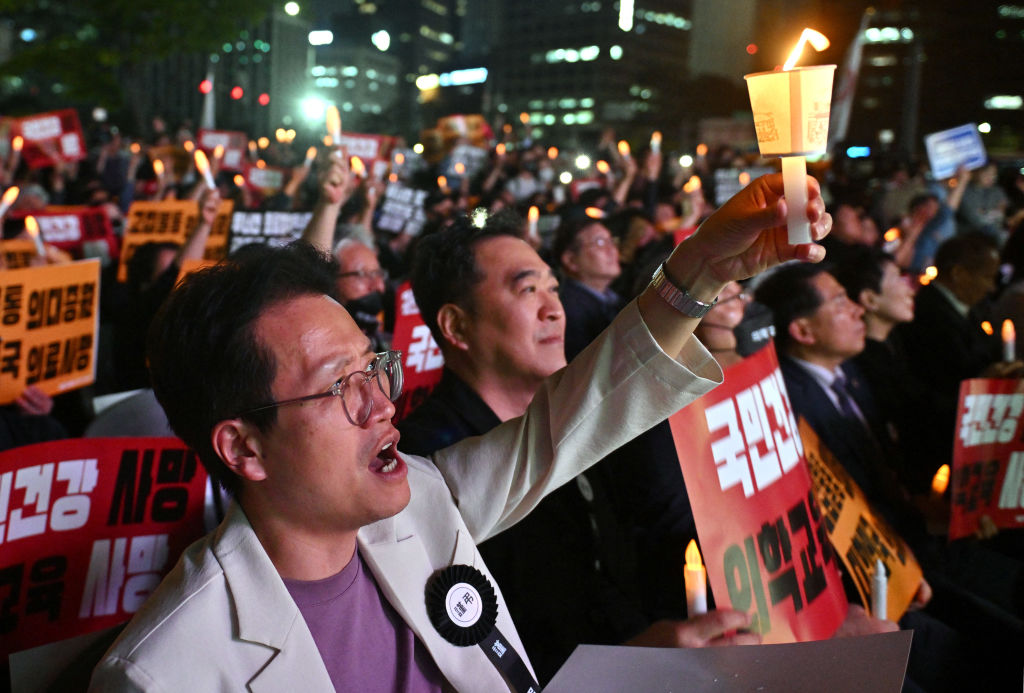SEOUL — South Korea’s government announced Monday it will abandon its plan to suspend the licenses of striking junior doctors as part of its efforts to convince them to return to work and resolve the country’s monthslong medical impasse.
[time-brightcove not-tgx=”true”]
It wasn’t immediately known whether the thousands of striking doctors would return to their hospitals after the announcement. The government’s concession could also invite accusations of unfairness given its treatment of previous labor strikes and of doctors who have already returned to work.
Health Minister Cho KyooHong said the government has decided not to suspend the licenses of the strikers, who are medical interns and residents, regardless of whether they return to their hospitals or not. He said the government will also offer special measures to returnees to minimize the gap in their training and help them obtain specialist licenses in time.
“After painstaking deliberations, the government has reached this decision based on an assessment that minimizing the medical vacuum in the treatment of emergency and seriously ill patients and maintaining a training system to supply specialists at the right time will serve the public interest more than anything else,” Cho said.
More than 90% of the country’s 13,000 medical interns and residents walked off their jobs in February to protest the government’s plan to sharply boost medical school admissions. The walkout has significantly burdened the operations of university hospitals where they were training and threatened to disrupt South Korea’s medical services.
Some senior doctors and professors at those teaching schools supported the walkout by holding rallies and temporarily walking off their jobs or reducing their working hours.
Officials have said they want to add up to 10,000 doctors by 2035 to cope with the country’s fast-aging population and a shortage of physicians in rural areas and in low-paying yet essential specialties like pediatrics and emergency departments.
Doctors say schools aren’t ready to handle such an abrupt increase in students and that it would ultimately undermine the country’s medical services. But critics argue that physicians, one of the best-paid jobs in South Korea, are mainly worried that having more doctors would lower their future incomes.
The government later took steps to withdraw its plan to suspend the licenses of doctors who returned to their hospitals but didn’t do so for those who remained off the job. Only a small number of strikers have returned to work. As of last Friday, about 8% of the 13,756 medical interns and residents at about 210 teaching hospitals were working, according to government records.
Government officials earlier threatened to impose three-month license suspensions on striking doctors and even indictments by prosecutors for refusing back-to-work orders. President Yoon Suk Yeol—who has said illegal strikes should be dealt with in line with the law—also called the doctors’ walkout an “illegal collective action.”
The standoff created strife among doctors, with some harassing colleagues who opted not to join or continue the strike, according to local media reports.
Cho, the health minister, said the government was aware of possible criticism over the issue of fairness in its decision not to suspend the licenses of the striking doctors. He said patient groups and some medical officials have called for an early end of the walkout by the striking doctors.
Last month, the government finalized a plan to increase next year’s medical school enrollment by about 1,500, down from its earlier push for a 2,000-student increase. The current medical student enrollment cap has been unchanged at 3,058 since 2006, with doctors blocking previous government attempts to raise it with vehement protests.

